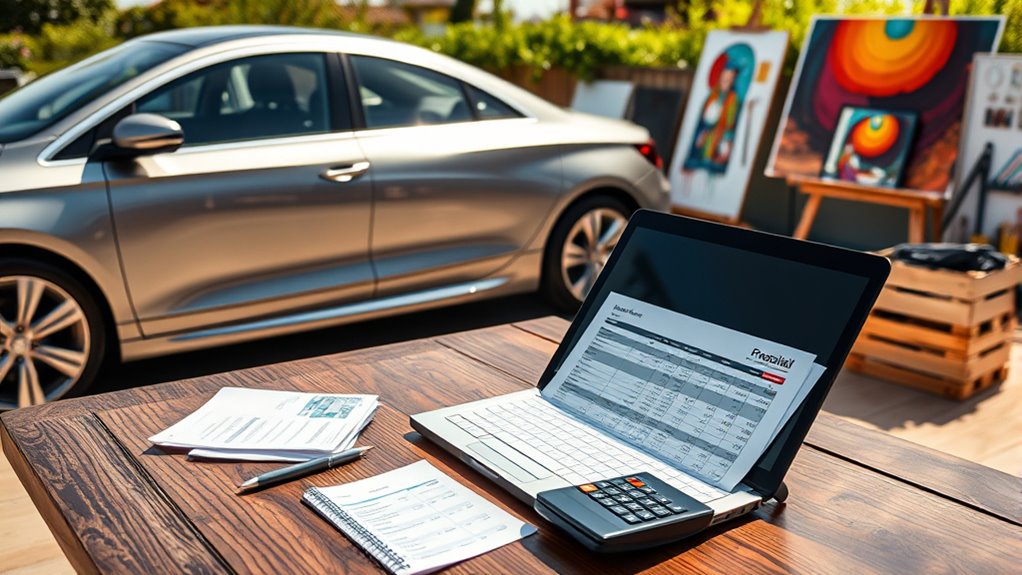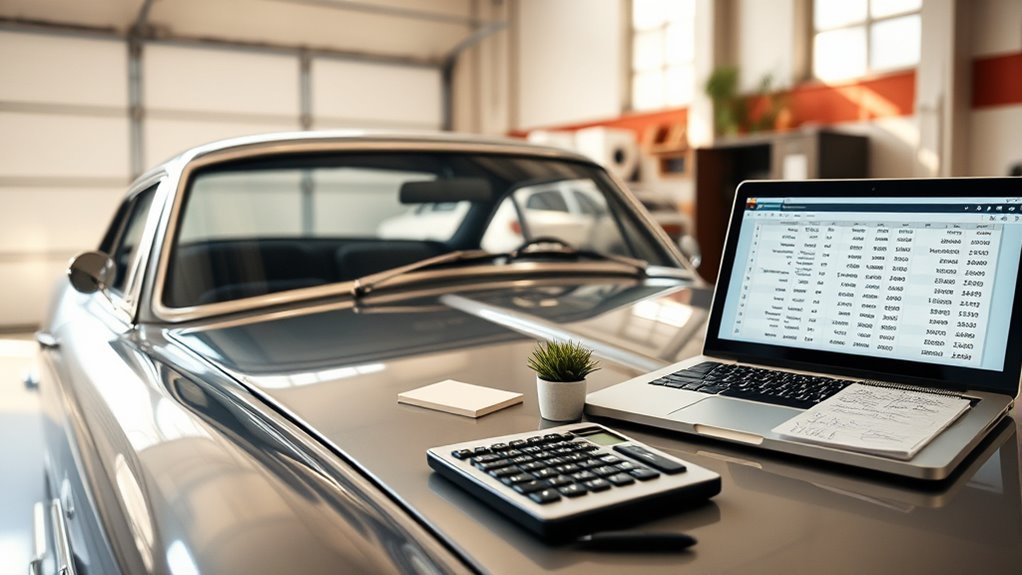To use depreciation for your freelance vehicle, keep detailed records of your purchase price, usage, and expenses like insurance and maintenance. Apply IRS depreciation methods, such as the straight-line or accelerated options, to deduct a portion of the vehicle’s value each year. Regularly update your depreciation schedule to optimize deductions and plan for vehicle replacements. If you want to maximize your tax benefits, understanding these steps will help you make smarter financial decisions.
Key Takeaways
- Track and record the vehicle’s purchase price, date, and depreciation schedule for accurate tax reporting.
- Deduct annual depreciation expenses on your tax return based on the vehicle’s depreciation method.
- Maintain detailed records of insurance, maintenance, and repair costs to support deductions.
- Use depreciation data to decide when to replace or upgrade your vehicle for optimal tax benefits.
- Ensure compliance by consulting tax laws and keeping thorough documentation of all depreciation-related expenses.

If you use a vehicle for your freelance business, understanding depreciation is essential. When you consider how your vehicle’s value diminishes over time, you can better manage your taxes and expenses. Depreciation allows you to deduct a portion of your vehicle’s cost each year, reflecting its loss in value. But it’s not just about the vehicle’s initial price; you also need to account for ongoing costs like insurance and maintenance expenses. These costs are part of the overall ownership, and understanding how depreciation interacts with them can optimize your tax benefits.
Understanding vehicle depreciation helps freelancers manage taxes, expenses, and optimize insurance and maintenance costs effectively.
Insurance costs are a significant part of your vehicle expenses. They tend to rise with the age and value of your vehicle, so knowing how depreciation affects your vehicle’s worth can help you estimate future insurance premiums. When your vehicle depreciates, its insurable value drops, which might lead to lower premiums over time. However, if you’re claiming depreciation on your taxes, you should keep detailed records of insurance expenses because they can be deducted as business expenses. Proper documentation ensures you maximize your deductions and stay compliant with tax laws.
Maintenance expenses are another critical aspect. As your vehicle ages, maintenance costs often increase, especially if depreciation indicates a decline in overall vehicle value. Regular repairs and servicing keep your vehicle in good condition, but they also eat into your budget. When you’re calculating depreciation, remember that maintenance expenses are separate but related costs. While maintenance isn’t directly deductible through depreciation, keeping track of these expenses allows you to offset your income more accurately. Some maintenance costs, such as repairs related to business use, may qualify for deductions on your taxes, further reducing your taxable income.
Using depreciation effectively means you’re not only tracking your vehicle’s decreasing value but also understanding how it interacts with your insurance and maintenance costs. This holistic approach helps you plan your expenses more efficiently. For example, if your vehicle’s depreciation schedule shows significant loss in value, you might decide to replace it sooner, saving on higher maintenance costs and potentially reducing insurance premiums. Conversely, if depreciation is slow, it might be worth holding onto the vehicle longer, provided the maintenance costs stay manageable.
To maximize your benefits, keep meticulous records of all related expenses, including insurance and maintenance costs. When tax season arrives, you’ll have everything you need to substantiate your depreciation claims and related deductions. Additionally, understanding the depreciation schedule for your vehicle can help you make informed decisions about repairs, upgrades, or replacements. This careful tracking ensures you’re making the most of your vehicle’s depreciation, optimizing your financial health, and maintaining compliance with tax regulations. Understanding depreciation isn’t just about saving money; it’s about making smarter decisions that support your freelance business’s growth.
Frequently Asked Questions
Can I Switch Between Standard Mileage and Depreciation Methods Annually?
You can switch between standard mileage and depreciation methods, but it’s not an annual update. Typically, you choose one method when you start using the vehicle for business and adhere to it. If you want to switch later, you may need to meet specific IRS requirements and possibly make an election. Always consult a tax professional to ensure you’re compliant and making the best choice for your situation.
How Do I Calculate Depreciation for Leased Vehicles?
To calculate depreciation for leased vehicles, you need to understand lease accounting rules. Typically, you won’t depreciate the vehicle yourself; instead, you record lease payments as an expense. However, for leased vehicles classified as capital leases, you create depreciation schedules similar to owned assets using the lease’s fair market value and lease term. Check the lease agreement and IRS guidelines to determine the proper method and guarantee accurate depreciation schedules.
Are Electric Vehicles Eligible for Special Depreciation Deductions?
Yes, electric vehicles are eligible for special depreciation deductions. You can take advantage of electric vehicle incentives and EV tax credits, which can substantially reduce your taxable income. These incentives often include bonus depreciation or Section 179 deductions, making EVs a smart choice for your freelance business. Be sure to check current federal and state programs, as these incentives can vary and may have specific eligibility requirements.
What Records Are Necessary to Claim Vehicle Depreciation?
Think of your records as the lighthouse guiding your tax deductions. To claim vehicle depreciation, you need detailed records of your vehicle expense, including purchase date, cost, and miles driven for business. Save receipts, mileage logs, and depreciation schedules. These documents prove your claim and make certain you maximize your tax deduction, keeping your financial ship steady and avoiding any stormy audits.
How Does Personal Use of the Vehicle Affect Depreciation Deductions?
Your personal use of the vehicle reduces your depreciation deductions because only the business-use portion qualifies. To accurately claim depreciation, you need to keep detailed records of your mileage and usage, distinguishing between personal and business use. This record-keeping is essential for supporting your deduction claims and complying with tax regulations. Be consistent and precise in tracking to maximize your allowable depreciation while accurately reflecting your vehicle’s use.
Conclusion
Just like tending a garden, managing your vehicle’s depreciation requires consistent care. By understanding how to nurture this process, you ensure your freelance journey stays fruitful. Think of depreciation as the gentle ebb and flow of seasons, gradually revealing your vehicle’s true worth. Embrace it as part of your business’s growth cycle, and watch your finances flourish like a well-tended garden, steady and resilient through every passing season.









